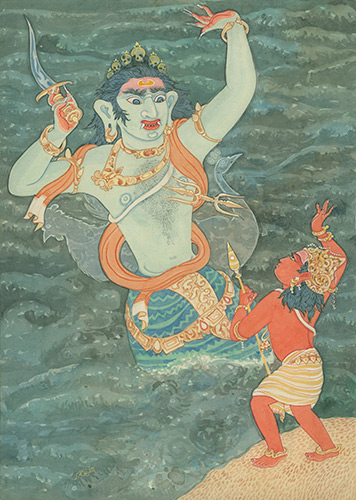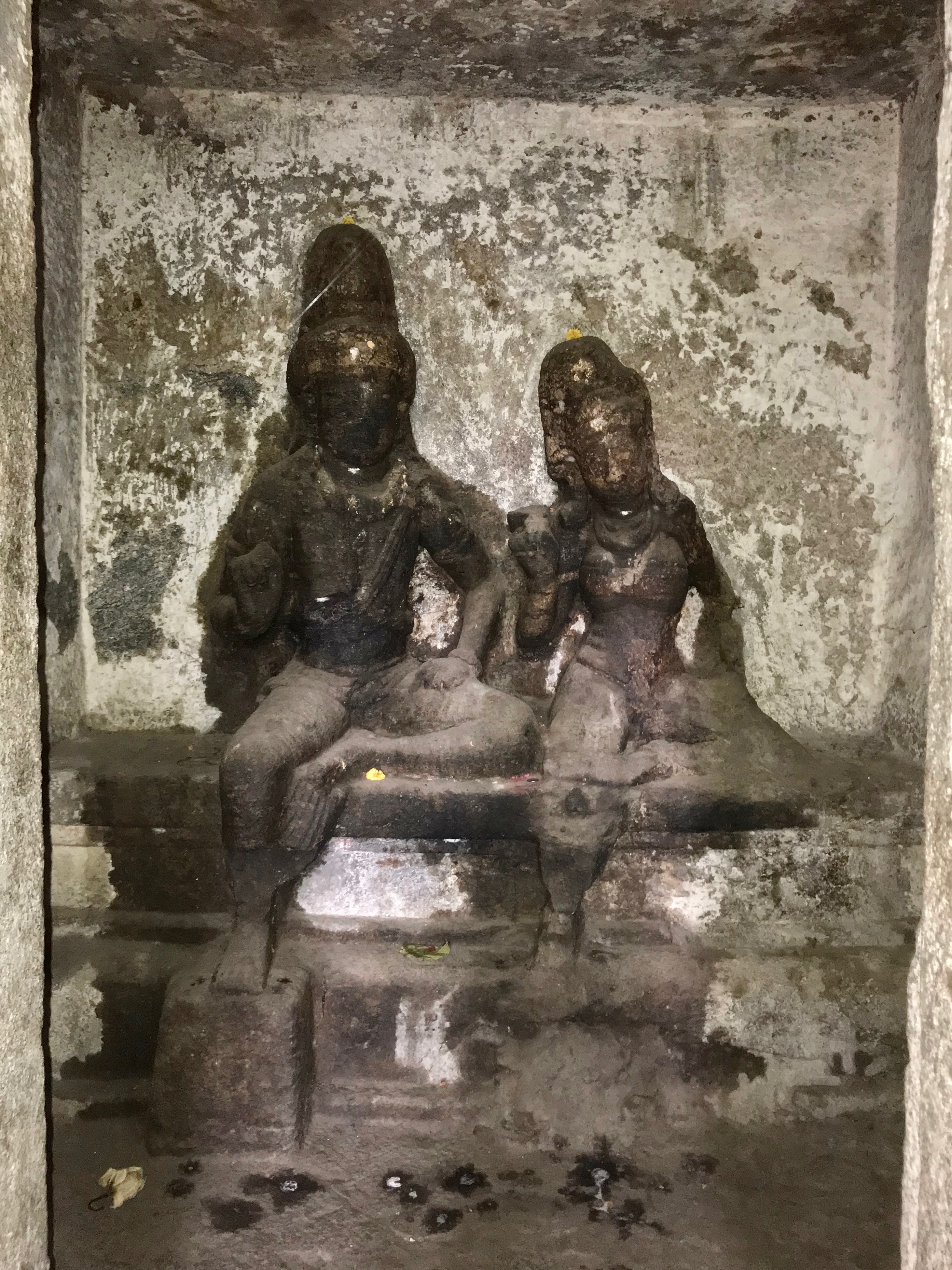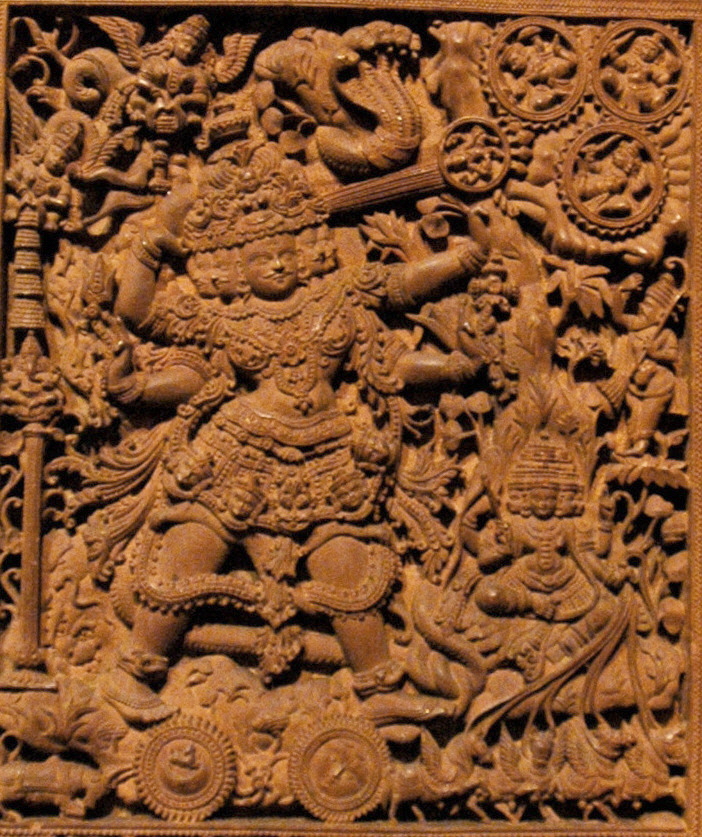|
Kartikeya
Kartikeya (/Sanskrit phonology, kɑɾt̪ɪkejə/; ), also known as Skanda (Sanskrit phonology, /skən̪d̪ə/), Subrahmanya (/Sanskrit phonology, sʊbɾəɦməɲjə/, /ɕʊ-/), Shanmukha (Sanskrit phonology, /ɕɑnmʊkʰə/) and Murugan (/Sanskrit phonology, mʊɾʊgən/), is the Hinduism, Hindu List of war deities, god of war. He is generally described as the son of the deities Shiva and Parvati and the brother of Ganesha. Kartikeya has been an important deity in the Indian subcontinent since Vedic period, ancient times. Mentions of Skanda in the Sanskrit literature data back to fifth century BCE and the mythology relating to Kartikeya became widespread in North India around the second century BCE. Archaeological evidence from the first century CE and earlier shows an association of his iconography with Agni, the Hindu god of fire, indicating that Kartikeya was a significant deity in early Hinduism. He is hailed as the "favoured god of the Tamils", and the tutelary dei ... [...More Info...] [...Related Items...] OR: [Wikipedia] [Google] [Baidu] |
Devasena
Devasena (, , ) is the Hindu goddess of aspirations, and the consort of the war god Kartikeya (Murugan). She is also known as Devayanai, Deivanai, and Deivayanai in Tamil texts. Her name is also spelled as Teyvanai or Tevayanai (). Devasena is described as the daughter of the ''Prajapati'' Daksha in the ''Mahabharata'', while some Sanskrit scriptures consider her as the daughter of Indra, the king of the devas (gods), and his wife Shachi. In the Tamil iteration of the Skanda Purana, she is portrayed as the daughter of the god Vishnu, who is later adopted by Indra. She is betrothed to Kartikeya by Indra, when he becomes the commander-in-chief of the devas. In Tamil accounts, Devasena is generally depicted as an antithesis of Valli, her sister-wife; together they complete the deity. Devasena is generally depicted with Murugan, and is often also accompanied by Valli. In Tamil Nadu, Devasena does not enjoy independent worship, but is venerated as Murugan's consort in most of ... [...More Info...] [...Related Items...] OR: [Wikipedia] [Google] [Baidu] |
Six Abodes Of Murugan
The Six Abodes of Murugan () are six temples situated in the state of Tamil Nadu in South India, dedicated to the Hinduism, Hindu deity Kartikeya, Murugan. These six sacred abodes of Murugan are mentioned in Tamil Sangam literature, in the texts of ''Tirumurukāṟṟuppaṭai'', written by Nakkeerar, Nakkīraṉãr, and in ''Tiruppukal, Tiruppukaḻ'', written by Arunagirinathar. The six abodes are Thiruparankundram Murugan temple, Thiruparankundram, Tiruchendur Murugan Temple, Tiruchendur, Palani Murugan Temple, Palani, Swaminathaswamy Temple, Swamimalai, Swamimalai, Subramaniya Swamy Temple, Tiruttani, Tiruttani, and Pazhamudircholai. Legend The legend of Murugan is described in the Skanda Puranam, the Tamil iteration of the Skanda Purana. According to the text, the asura Śūrapadmā, Surapadman drove the Deva (Hinduism), devas out of Svarga, and the latter sought the assistance of the deities Vishnu and Brahma. They assigned Kamadeva to disturb Shiva from his penance and fal ... [...More Info...] [...Related Items...] OR: [Wikipedia] [Google] [Baidu] |
Parvati
Parvati (, , IPA: /Sanskrit phonology, pɑɾʋət̪iː/), also known as Uma (, , IPA: Sanskrit phonology, /ʊmɑː/) and Gauri (, , IPA: /Sanskrit phonology, gə͡ʊɾiː/), is one of the principal goddesses in Hinduism, revered as the Devi, goddess of power, energy, nourishment, harmony, love, beauty, devotion, and motherhood. Along with Lakshmi and Saraswati, Sarasvati, she forms the trinity, known as the Tridevi. From her first appearance as a goddess during the Itihasa-Purana, epic period (400 BCE – 400 CE), Parvati is primarily depicted as the consort of the god Shiva. According to various Puranas, Parvati is the reincarnation of Sati (Hindu goddess), Sati, Shiva's first wife, who relinquished her body to sever familial ties with her father, Daksha, after he had insulted Shiva. Parvati is often equated with the other goddesses such as Sati, Uma, Kali and Durga and due to this close connection, they are often treated as one and the same, with their stories frequently ove ... [...More Info...] [...Related Items...] OR: [Wikipedia] [Google] [Baidu] |
Shiva
Shiva (; , ), also known as Mahadeva (; , , Help:IPA/Sanskrit, [mɐɦaːd̪eːʋɐh]) and Hara, is one of the Hindu deities, principal deities of Hinduism. He is the God in Hinduism, Supreme Being in Shaivism, one of the major traditions within Hinduism. Shiva is known as ''The Destroyer'' within the Trimurti, the Hinduism, Hindu trinity which also includes Brahma and Vishnu. In the Shaivite tradition, Shiva is the Supreme Lord who creates, protects and transforms the universe. In the goddess-oriented Shaktism, Shakta tradition, the Supreme Goddess (Devi) is regarded as the energy and creative power (Shakti) and the equal complementary partner of Shiva. Shiva is one of the five equivalent deities in Panchayatana puja of the Smarta Tradition, Smarta tradition of Hinduism. Shiva has many aspects, benevolent as well as fearsome. In benevolent aspects, he is depicted as an Omniscience, omniscient yogi who lives an Asceticism#Hinduism, ascetic life on Kailasa as well as a house ... [...More Info...] [...Related Items...] OR: [Wikipedia] [Google] [Baidu] |
Valli
Valli () is a devi, Hindu goddess, and the second consort of the deity Murugan. An incarnation of the goddess Sundaravalli, daughter of Vishnu, Valli is born on earth as the daughter of a chieftain, leading a life of a huntress. Murugan, the god of war, eventually woos and weds her, according to Tamil mythology, Tamil folklore. Both of their legends originate from the mountain region also known as Sangam landscape, Kurunji in Tamilakam. Her sister, Devasena, Amritavalli (Devasena), also succeeds in marrying Murugan as the adopted daughter of Indra, making them sister-wives. Nomenclature ''Vaḷḷi'' is used to refer to many Village deities of South India, local or Grāmadevatā, Village gods in Tamil Nadu and Kerala in India and by the Rodiya and Vedda peoples of Sri Lanka. Vaḷḷi is also known as ''Pongi'' at Vallimalai in Vellore district, Vellore, Tamil Nadu, and the pond from which she drew water to quench the thirst of Murugan is still there. This pond, though in an o ... [...More Info...] [...Related Items...] OR: [Wikipedia] [Google] [Baidu] |
Karthika Deepam
Karthika Deepam () is a Hindu festival of lights. It is mainly observed mainly by Tamils in India, Sri Lanka and other regions with significant Tamil diaspora. The festival is celebrated on the first full moon day of the month of Kartika coinciding with Kṛttikā nakshatra, falling on the Gregorian months of November or December. Though it corresponds to the Kartik Purnima, it falls on a different day due to the correction of equinoxes in the Tamil calendar. The festival is associated with Shaivism, is celebrated to commemorate the origin of Kartikeya, the Hindu god of war, and Shiva's manifestation as Jyotirlinga. In Kerala, it is celebrated as Thrikarthika, in honour of goddess Parvati. History One of the earliest references to the festival is found in the Tamil anthology ''Akanaṉūṟu'', dating back to the Sangam period (200 BCE to 300 CE). The festival is referred in songs of poetess Avvaiyar. The festival is also referred in the Sangam literature as ''Peruvi� ... [...More Info...] [...Related Items...] OR: [Wikipedia] [Google] [Baidu] |
Ganesha
Ganesha or Ganesh (, , ), also known as Ganapati, Vinayaka and Pillaiyar, is one of the best-known and most worshipped Deva (Hinduism), deities in the Hindu deities, Hindu pantheon and is the Supreme God in the Ganapatya sect. His depictions are found throughout India. Hindu denominations worship him regardless of affiliations. Devotion to Ganesha is widely diffused and extends Ganesha in world religions, to Jains and Buddhists and beyond India. Although Ganesha has many attributes, he is readily identified by his Asiatic Elephant, elephant head and four arms. He is widely revered, more specifically, as the remover of obstacles and bringer of good luck; the patron of The arts, arts and Science, sciences; and the Deva (Hinduism), deva of intellect and wisdom. As the god of beginnings, he is honoured at the start of rites and ceremonies. Ganesha is also invoked during writing sessions as a patron of letters and learning., Vigna means obstacles Nasha means destroy. These ideas ar ... [...More Info...] [...Related Items...] OR: [Wikipedia] [Google] [Baidu] |
Shashthi
Shashthi, Shashti, Soshthi or Chhathi (, , , , , literally "sixth") is a Hindu goddess, venerated in Nepal and India as the benefactor and protector of children. She is also the deity of vegetation and reproduction and is believed to bestow children and assist during childbirth. She is often pictured as a motherly figure, riding a cat and nursing one or more infants. She is symbolically represented in a variety of forms, including an earthenware pitcher, a banyan tree or part of it or a red stone beneath such a tree; outdoor spaces termed ''Shashthi Tala'' are also consecrated for her worship. The worship of Shashthi is prescribed to occur on the sixth day of each lunar month of the Hindu calendar as well as on the sixth day after a child's birth. Barren women desiring to conceive and mothers seeking to ensure the protection of their children will worship Shashthi and request her blessings and aid. She is especially venerated in eastern India. Also known as Chhathi Maiya (छ� ... [...More Info...] [...Related Items...] OR: [Wikipedia] [Google] [Baidu] |
Karthikeyan
Karthikeyan (in short Karthikeya, Karthik, Kartik) is an Indian masculine given name derived from the Lord Kartikeya. People * D. R. Karthikeyan, an Indian Police Service Officer. * G. Karthikeyan, an Indian politician and the speaker of the Kerala Legislative Assembly * M. L. R. Karthikeyan, an Indian playback singer * Murali Karthikeyan, an Indian chess Grandmaster * Narain Karthikeyan, the first Formula One motor racing driver from India * P. S. Karthikeyan, an Indian politician who was a member of the Kerala Legislative Assembly * Sivakarthikeyan Sivakarthikeyan Doss (born 17 February 1985), also known by the initialism SK, is an Indian actor, playback singer, lyricist, film producer and television presenter, who works predominantly in Tamil cinema. In 2021, he won the Kalaimamani Awar ..., an Indian film actor, television anchor, and stand-up comedian of Tamil Nadu * Sujata R. Karthikeyan, an IAS officer and wife of V. K. Pandian See also * Karthik (disambigua ... [...More Info...] [...Related Items...] OR: [Wikipedia] [Google] [Baidu] |
List Of War Deities
A war god in mythology associated with war, combat, or bloodshed. They occur commonly in polytheistic religions. Unlike most gods and goddesses in polytheistic religions, monotheistic deities have traditionally been portrayed in their mythologies as commanding war in order to spread religion. (The intimate connection between " holy war" and the "one true god" belief of monotheism has been noted by many scholars, including Jonathan Kirsch in his book ''God Against The Gods: The History of the War Between Monotheism and Polytheism'' and Joseph Campbell in ''The Masks of God, Vol. 3: Occidental Mythology''.) The following is a list of war deities: Africa Egyptian *Anat-- also known as Anath-- was a goddess of fertility, sexuality, love, and war. She was the sister of Baal * Anhur, god of war, not a native god * Anuke, a goddess of war and consort of Anhur * Apedemak, the lion god of war: he is sometimes depicted with three heads * Bast, cat-headed goddess associated with war, ... [...More Info...] [...Related Items...] OR: [Wikipedia] [Google] [Baidu] |
Kartik Purnima
Kartika Purnima (), also known as Kartika Pournami, is a Hindu, Sikh, and Jain cultural festival that is celebrated on ''purnima'' (full moon day), the 15th day of the lunar month Kartika. It falls on November or December of the Gregorian calendar and is also known as Tripurari Purnima or Deva-Deepavali, the gods's festival of lights. Karthika Deepam is a related festival that is celebrated in South India and Sri Lanka on a different date. It follows Diwali by about 15 days. Significance Radha-Krishna In Vaishnavite tradition, this day is considered significant and special for the worship of both Radha and Krishna. It is believed that on this day, Radha-Krishna performed rasalila with their gopis. At Jagannath Temple, Puri and all other Radha-Krishna temples, a sacred vow is observed throughout Kartika month, and performances of raaslila are organized on the day of Kartika Purnima. According to Brahma Vaivarta Purana, Krishna worshipped Radha on this day. Sh ... [...More Info...] [...Related Items...] OR: [Wikipedia] [Google] [Baidu] |
Indian Peafowl
The Indian peafowl (''Pavo cristatus''), also known as the common peafowl, or blue peafowl, is a peafowl species native to the Indian subcontinent. While it originated in the Indian subcontinent, it has since been introduced to many other parts of the world. Male peafowl are referred to as ''peacocks'', and female peafowl are referred to as ''peahens'', although both sexes are often referred to colloquially as a "peacock". The Indian peafowl displays a marked form of sexual dimorphism. The brightly coloured male has a blue coloured head with a fan-shaped crest and is best known for his long train. The train is made up of elongated upper-tail covert feathers with colourful eyespots. These stiff feathers are raised into a fan and quivered in a display during courtship. The peahen is predominantly brown in colour, with a white face and iridescent green lower neck, and lacks the elaborate train. There are several colour mutations of the Indian peafowl including the leucistic white ... [...More Info...] [...Related Items...] OR: [Wikipedia] [Google] [Baidu] |









